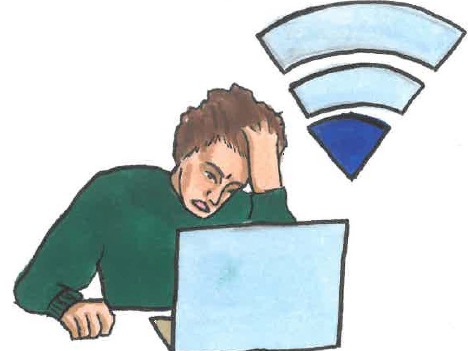
By Alex Westcott
Staff Writer
During the first week of the semester, many students on campus reported recurring problems with slow internet. Browsers were barely loading web pages, if they did at all. Students reported being unable to finish or submit time-sensitive homework assignments as their browser couldn’t load Canvas.
“I was freaking out,” said Emma Almanzar ‘20, a sociology major. “I couldn’t submit anything or look up anything. I just stared at a blank screen.”
With the volume of reports flooding into the help desk, Information Technology quickly figured out that the issue was widespread. This led to two separate maintenances on August 29 that ultimately solved the problem. Erik Lightbody, Assistant Director of Technology Services, said that the situation is unlikely to recur because of the new connection to FirstLight Fiber, the school’s internet service provider. It was faulty equipment on their end which ultimately caused the problem.
“[FirstLight] provides internet to hundreds of customers in the area,” said Lightbody, “The physical equipment that our internet connection was plugged into was broken.” He explained that Saint Michael’s has two physical connections to the equipment at FirstLight, one of which serves as a backup in case of an unexpected breaking of one of the connections.
The first sign of the real problem came when IT noticed a high number of packet drops on one of these lines. Packets are broken up bits of data that get sent through the network and match up when they reach their destination.
“What happens when you drop packets is that letters drop off that document,” Lightbody said. “So if you print a five page paper, and it came out on five pages, but every tenth letter was missing, that’s like dropping packets. Sometimes it needs to go back and recheck, and that can take a little bit,” he said.
FirstLight told IT that the line could be faulty, so they unplugged it from the piece of equipment it was attached to and replugged it into a different piece. But when IT examined the internet traffic on the other line, there was still packet dropping, and this time it was worse.
Then, FirstLight took both lines and connected them to different pieces of equipment, solving the problem.
Lightbody said that each individual is granted a certain chunk of the school’s total bandwidth. So, your internet speed will not be slowed down if your roommate is downloading 500 movies at once. If, for example, every student on campus were doing that, then our total bandwidth would eventually be maxed out, but on an individual level, this won’t make a difference.
Professors and other faculty members didn’t seem to notice their internet speeds slowing down. Lightbody said that most of the reports came during peak usage times when most students are out of classes and using the internet. Greta Pangborn, a computer science professor at St. Michael’s, said that although she’s been experiencing network issues in one of the computer labs, these computers were tied to the internet through physical cables, not over wireless connection. “The timing of our delays didn’t seem to match up with when others had troubles,” Pangborn said.
Experiencing tech problems?
Erik Lightbody emphasizes that when you encounter technology problems, especially with the Internet, you should report them, and provide as much detailed information about your situation as possible. Make sure to mention where you live on campus and when you’re experiencing the problem. For simpler issues, such as problems with printing or password resets, the portal contains step-by-step instructions to guide you through those processes under the ‘Information Technology’ tab along the top of the screen. Be sure to take a look at those before you head over to the help desk.

